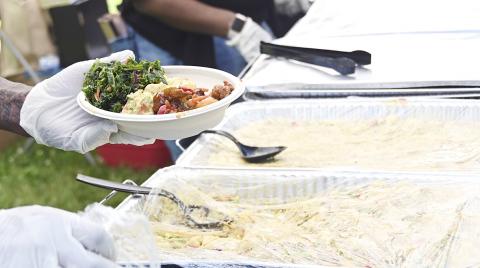Vegetarians have a lower risk of coronary heart disease than meat-eaters but a greater risk of having a stroke, researchers have found.
Meat-eating has been decried as damaging for the environment, while there are also health concerns: the World Health Organization has classed processed meat as a cause of cancer , and red meat as a probable cause. But as alternative diets take off , researchers say further scrutiny is important.
“Vegetarian and vegan diets have increased hugely in popularity over the past years, but we actually know very little about the potential health benefits or hazards of these diets,” said Tammy Tong, first author of the study from the University of Oxford.

Photo: AP
Writing in the British Medical Journal , Tong and colleagues report that they analysed data from more than 48,000 adults who signed up to a wider study between 1993 and 2001, and who had no history of heart attack, stroke or angina.
As well as being asked questions on lifestyle and medical history, on joining the study participants were also quizzed about their diet, allowing the team to classify individuals as meat-eaters, vegetarians, vegans or pescatarians. Some of these questions were asked again in 2010 and participants were re-classified if they had switched diet. As the study involved very few vegans, these individuals were grouped with vegetarians in the analysis.
The health of participants was followed through medical records until March 2016, during which time there were 2,820 cases of coronary heart disease and 1,072 cases of stroke.

Photo: AP
The results reveal that once factors including age, sex, smoking status and socioeconomic status were taken into account, fish eaters had a 13 percent lower risk of coronary heart disease than meat-eaters, while vegetarians had a 22 percent lower risk.
Meanwhile, vegetarians had a 20 percent higher risk of having a stroke than meat-eaters. There was no clear effect for fish-eaters.
Overall, the findings mean that over a 10-year period, there would be 10 fewer cases of coronary heart disease in vegetarians than in meat eaters per 1,000 people, and three more cases of stroke.
While the latest study does not prove that meat-eating or vegetarianism is behind the differences in risk, Tong said the association between a vegetarian diet and coronary heart disease supports previous research.
“It was likely that the lower risk in both pescatarians and vegetarians are related to the fact that they have lower cholesterol, but also a lower BMI, lower blood pressure and also a lower rate of diabetes,” she said.
Tong suggested one reason vegetarians might have a higher risk of stroke could be due to lower levels of cholesterol, which could increase the risk of certain types of stroke. Alternatively, the association might be down to vegetarians having lower levels of certain nutrients, such as vitamin B12.
However, others said the data suggested that was unlikely.
“It may well be that people who follow alternative diets are less likely to take blood pressure lowering medication for hypertension and as a consequence suffer a stroke,” suggested Tom Sanders from King’s College London.
The study has limitations, including the fact that it is based on self-reporting, and that not all participants answered questions in 2010. The study also mainly involved white people living in the UK, so it is not clear whether the results would hold in other populations.
Dr Frankie Phillips, a dietitian from the British Dietetic Association, said vegetarians and vegans should not be alarmed by the results, stressing that the study does not show cause and effect.
Instead, Phillips said, everyone could benefit from eating more plants.
“That doesn’t necessarily mean becoming completely vegan or vegetarian,” she said, adding that having a wide range of foods in the diet ensured it provided all the necessary nutrients.

In the March 9 edition of the Taipei Times a piece by Ninon Godefroy ran with the headine “The quiet, gentle rhythm of Taiwan.” It started with the line “Taiwan is a small, humble place. There is no Eiffel Tower, no pyramids — no singular attraction that draws the world’s attention.” I laughed out loud at that. This was out of no disrespect for the author or the piece, which made some interesting analogies and good points about how both Din Tai Fung’s and Taiwan Semiconductor Manufacturing Co’s (TSMC, 台積電) meticulous attention to detail and quality are not quite up to

April 21 to April 27 Hsieh Er’s (謝娥) political fortunes were rising fast after she got out of jail and joined the Chinese Nationalist Party (KMT) in December 1945. Not only did she hold key positions in various committees, she was elected the only woman on the Taipei City Council and headed to Nanjing in 1946 as the sole Taiwanese female representative to the National Constituent Assembly. With the support of first lady Soong May-ling (宋美齡), she started the Taipei Women’s Association and Taiwan Provincial Women’s Association, where she

It is one of the more remarkable facts of Taiwan history that it was never occupied or claimed by any of the numerous kingdoms of southern China — Han or otherwise — that lay just across the water from it. None of their brilliant ministers ever discovered that Taiwan was a “core interest” of the state whose annexation was “inevitable.” As Paul Kua notes in an excellent monograph laying out how the Portuguese gave Taiwan the name “Formosa,” the first Europeans to express an interest in occupying Taiwan were the Spanish. Tonio Andrade in his seminal work, How Taiwan Became Chinese,

Mongolian influencer Anudari Daarya looks effortlessly glamorous and carefree in her social media posts — but the classically trained pianist’s road to acceptance as a transgender artist has been anything but easy. She is one of a growing number of Mongolian LGBTQ youth challenging stereotypes and fighting for acceptance through media representation in the socially conservative country. LGBTQ Mongolians often hide their identities from their employers and colleagues for fear of discrimination, with a survey by the non-profit LGBT Centre Mongolia showing that only 20 percent of people felt comfortable coming out at work. Daarya, 25, said she has faced discrimination since she